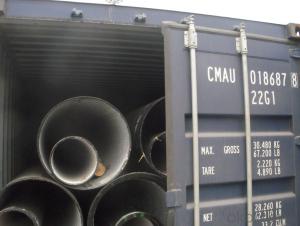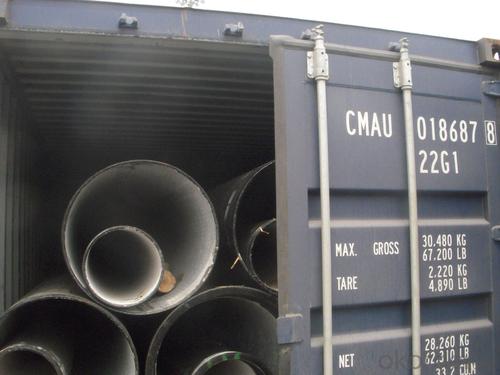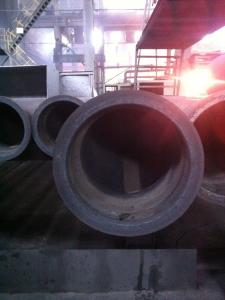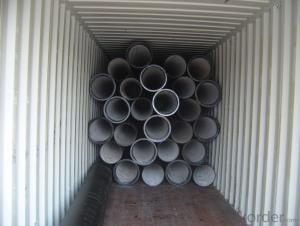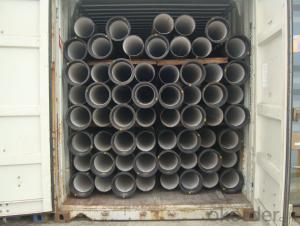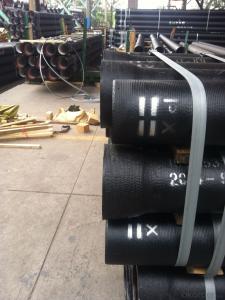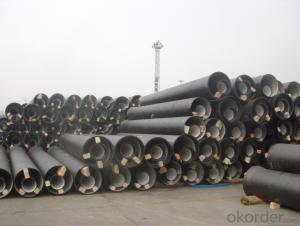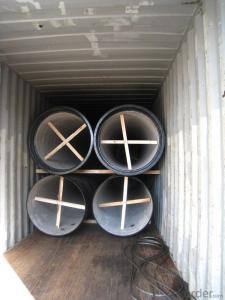DUCTILE IRON PIPES AND PIPE FITTINGS k8 CLASS DN1200
- Loading Port:
- Tianjin
- Payment Terms:
- TT OR LC
- Min Order Qty:
- 22 pc
- Supply Capability:
- 3000 pc/month
OKorder Service Pledge
OKorder Financial Service
You Might Also Like
Material : Ductile Cast Iron
Size Range : DN 80mm to DN 2000mm
Unit Effective Length : 6m or 5.7m
Manufacture Standard: ISO 2531:1998/ EN 545:2006/EN 598:2007
Annual capacity : 200,000 tons
Coating Exterior: Zinc 130g/m2 according to ISO 8179-1 and bitumen coating 70 microns.
Cement Interior: Portland Cement/ High Alumina Cement/ Sulphate Resisting Cement Lining according to ISO 4179
Special requirements on external coating and internal lining can be applied
We also provide accessories such as SBR/EPDM rubber gaskets, lubricant paste, pipe caps, PE sleeves, etc.
Additional Parts:
Each pipe is strictly inspected according to related standard to ensure permanently high performance.
Easy Installation at site and service free for life
Long Service Lifespan
Quotation will arrive you within 24hours once we get your inquiry.
We guarantee offering you a competitive price.
A copy of original inspection reports of pipes will be offered after shipment.
Photos of loading process will be sent to the customer after shipment effect.
We will follow-up the delivery progress after shipment effect and update to the customer on weekly basis.
- Q: Can ductile iron pipe be used for hot water applications?
- Yes, ductile iron pipe can be used for hot water applications. Ductile iron pipe is known for its strength, durability, and high resistance to corrosion, which makes it suitable for a wide range of applications, including hot water systems. It can handle high temperatures and pressure, making it a reliable choice for transporting hot water. Additionally, ductile iron pipe's thermal conductivity properties allow for efficient heat transfer, ensuring that hot water is delivered effectively throughout the system. Therefore, when considering materials for hot water applications, ductile iron pipe is a suitable option.
- Q: Can ductile iron pipe be used for industrial wastewater applications?
- Yes, ductile iron pipe can be used for industrial wastewater applications. Ductile iron pipe is known for its strength, durability, and resistance to corrosion, making it suitable for various applications including wastewater systems. It can handle high-pressure and heavy-duty environments, making it ideal for industrial wastewater applications that may involve abrasive or corrosive substances. Additionally, ductile iron pipe can be easily installed and maintained, reducing the overall costs and ensuring long-term reliability. However, it is important to consider the specific requirements of the wastewater application and consult with professionals to determine the most suitable pipe material and design.
- Q: How are ductile iron pipes protected against abrasion or wear?
- Various methods and protective coatings are utilized to protect ductile iron pipes against abrasion or wear. One commonly employed method involves the application of cement mortar lining on the inner surface of the pipe. This creates a smooth and durable layer that effectively resists the damaging effects of flowing water and other substances passing through the pipe. Furthermore, external protection for ductile iron pipes can be achieved by applying a bituminous or epoxy coating. These coatings act as a barrier, safeguarding against external factors like soil or chemicals that may lead to wear or corrosion. By serving as a protective layer, they prevent direct contact between the iron pipe and the surrounding environment. Moreover, in areas where severe abrasion or wear conditions are prevalent, special linings or coatings can be applied. Polyethylene encasement or polyurethane lining can be utilized to provide enhanced protection against abrasion, especially in regions where the pipe is exposed to high turbulence or abrasive materials. In certain cases, ductile iron pipes can also be reinforced with additional materials such as fiberglass or steel wire to increase their resistance to abrasion or wear. These reinforcements offer an extra layer of protection, strengthening the pipe and reducing the likelihood of damage. Overall, ductile iron pipes are designed with a combination of protective measures to ensure their durability and resistance to abrasion or wear. These measures encompass cement mortar linings, protective coatings, special linings or coatings for severe conditions, and reinforcements. These protective methods play a crucial role in prolonging the lifespan of the pipes and maintaining their functionality even in challenging environments.
- Q: What is the expected service life of ductile iron pipe?
- The expected service life of ductile iron pipe can vary depending on various factors such as the environment, soil conditions, water quality, and the level of maintenance and corrosion protection measures implemented. However, on average, ductile iron pipe is designed to have a service life of 75 to 100 years. This is due to its superior strength, durability, and resistance to corrosion. Ductile iron pipe is known for its ability to withstand harsh conditions and has been used extensively in water and wastewater systems, industrial applications, and other infrastructure projects. Regular maintenance and proper corrosion protection can further extend the service life of ductile iron pipe, ensuring its continued reliability and performance over many decades.
- Q: Do ductile iron pipes require internal linings for potable water?
- No, ductile iron pipes do not require internal linings for potable water. Ductile iron is a type of iron that has been treated to enhance its strength and flexibility. It is commonly used for water distribution systems due to its durability and resistance to corrosion. Unlike other materials, such as cast iron or steel, ductile iron pipes have a protective layer called a cement-mortar lining, which provides an effective barrier against corrosion and prevents the leaching of any harmful substances into the water. This lining is applied during the manufacturing process and is designed to withstand the corrosive properties of potable water, making internal linings unnecessary. Additionally, the smooth surface of ductile iron pipes helps to maintain the quality and flow of water without the need for additional linings.
- Q: What effect does magnesium play in nodular cast iron?
- The role of magnesium as spheroidizing agent used in iron spheroidizing treatment, promote water ink is made of iron, carbon in liquid iron spherical graphite precipitation.
- Q: How does ductile iron pipe perform in areas with high soil stability?
- Ductile iron pipe performs exceptionally well in areas with high soil stability. Due to its inherent strength and durability, ductile iron pipe can withstand the pressure exerted by the soil without any significant deformation or failure. The high soil stability ensures that there are minimal ground movements, settling, or shifting, which further contributes to the excellent performance of ductile iron pipe. In areas with high soil stability, the pipe is less prone to experiencing external forces or stresses that could potentially cause damage. Ductile iron pipe has a high resistance to corrosion, abrasion, and impact, making it highly suitable for such conditions. The material's robustness allows it to withstand the weight and pressure of the soil, ensuring the structural integrity of the pipe is maintained over time. Moreover, ductile iron pipe's flexibility and joint design contribute to its performance in areas with high soil stability. The pipe's ability to accommodate small movements and minor ground shifts without compromising its integrity is advantageous in these stable soil conditions. The restrained joint system used in ductile iron pipe installations provides additional support and stability, minimizing the risk of pipe dislocation or failure. Overall, ductile iron pipe is a reliable and efficient choice for areas with high soil stability. Its strength, durability, and resistance to external forces make it well-equipped to handle the demands of such environments. Additionally, the pipe's flexibility and joint design ensure that it can adjust to minor soil movements, thus further enhancing its performance in these conditions.
- Q: What is the average diameter range of ductile iron pipes?
- The average diameter range of ductile iron pipes can vary depending on the specific application and industry standards. However, in general, ductile iron pipes are available in a wide range of diameters to meet various requirements. Commonly, the average diameter range for ductile iron pipes can start from as small as 4 inches (100 mm) and go up to 64 inches (1600 mm) or even larger. These sizes are often used for water distribution, sewer systems, and other infrastructure projects. It is important to note that the specific diameter range of ductile iron pipes can be influenced by factors such as local regulations, project specifications, and engineering considerations. Therefore, it is recommended to consult industry standards and relevant authorities to determine the appropriate diameter range for a specific application.
- Q: What is the expected abrasion resistance of ductile iron pipes?
- The expected abrasion resistance of ductile iron pipes is generally high. Ductile iron pipes are known for their durability and strength, making them suitable for various applications, including transporting water, sewage, and other fluids. The material composition of ductile iron pipes, which includes a significant amount of carbon and silicon, contributes to their abrasion resistance. Ductile iron pipes are designed to withstand the abrasive forces that can occur during the transportation of fluids. They have a smooth internal surface that reduces friction and minimizes the potential for abrasion. Additionally, the material's inherent toughness and resistance to wear and tear make ductile iron pipes less prone to damage caused by abrasive particles or debris in the flowing fluid. However, it is important to note that the expected abrasion resistance of ductile iron pipes can also depend on various factors such as the velocity and nature of the fluid being transported, the presence of corrosive substances, and the installation conditions. In some cases, additional protective measures such as linings or coatings may be required to enhance the pipes' resistance to abrasion. Overall, ductile iron pipes are known for their excellent abrasion resistance, but it is always advisable to consider specific application requirements and consult with experts to ensure the appropriate selection and installation of the pipes for optimal performance and longevity.
- Q: How to analyze and judge the quality of ductile iron pipe
- The quality of water supply pipe ductile is a topic worthy of discussion, how to judge the quality of the ductile iron pipe, ductile now on the market is all kinds of pipe, a name sand type ductile iron pipe, ductile water-cooling tube, K8 grade K9 grade ductile iron pipe, ductile iron pipe, also the brand is divided into ductile ductile pipe pipe, big brands, and some well-known manufacturers of producing ductile pipe,
Send your message to us
DUCTILE IRON PIPES AND PIPE FITTINGS k8 CLASS DN1200
- Loading Port:
- Tianjin
- Payment Terms:
- TT OR LC
- Min Order Qty:
- 22 pc
- Supply Capability:
- 3000 pc/month
OKorder Service Pledge
OKorder Financial Service
Similar products
Hot products
Hot Searches
Related keywords
